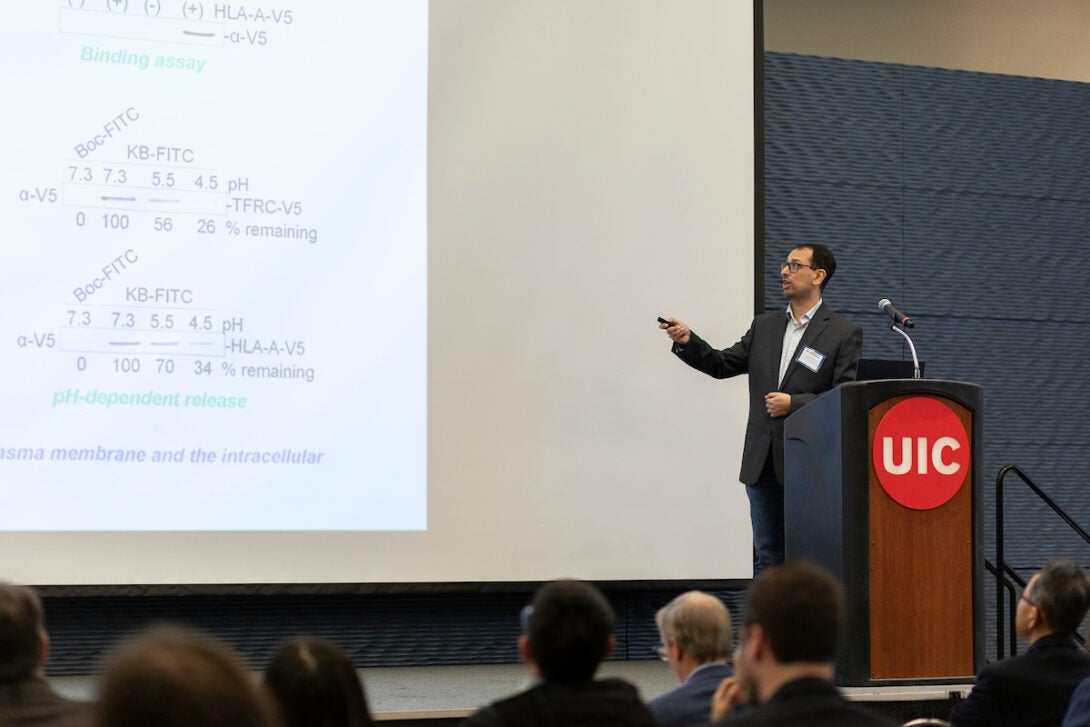Health Matters
Reframing Modern Health Concerns

LAS faculty aim to understand how disparate issues connected to everyday life influence the health of individuals and their communities. While traditional views of health-related research tend to limit the questions that are directly related to disease and treatment, our researchers broaden this approach by considering how culture, policy, environment, behavior, and technology shape our well-being.
In sum, LAS offers a synergistic approach to studying health, which is increasingly understood as involving complex interactions among different facets of life. We work on connections between health and the environment, both physical and social. Our faculty study the promotion of psychological well-being through work on social and health-related behaviors and undertake work in the basic sciences that lead to the development of drugs and materials that support healthy individuals and communities.
Representative Research
-
HIV/AIDS Research
One of the noted accomplishments of our Health Matters-centered research is the patent for Prezista, an essential part of the current HIV-maintenance regimen that helps boost immune cells and lower the viral load. (This has been the largest royalty producer for the UI system for quite some time.) Prezista was the result of work by a UIC Chemistry Professor, Dr. Arun Ghosh. His work extended the life of HIV-positive patients and provided an alternative treatment for drug resistance. Dr. Wonhwa Cho, a Distinguished Professor of Chemistry who collaborated with Dr. Ghosh, hopes to continue this tradition of fundamental science to clinical impact by seeking to understand how cholesterol and lipids influence cell signaling and thus, cell function. His work may be critical in helping us understand the disparity in outcomes for overweight patients with cancer and may provide new avenues for therapeutic combinations.
-
Clean Water
Water is one of the core issues of twenty-first-century policy and science. LAS faculty members recognize the need to protect this precious resource. The influence of freshwater on health and wellbeing is illustrated by the research of Dr. Rachel Havrelock (English) and Dr. Max Berkelhammer (Earth and Environmental Sciences). Dr. Havrelock connects water management in the Middle East to social and political instability in the region. She is also one of the founders of The Freshwater Lab which seeks to understand and inform the policy and politics surrounding the water issues in the Great Lakes Region. From a complementary scientific perspective, Dr. Berkelhammer investigates the water cycle and how ecological and environmental changes influence the availability of water.
-
Adolescent Tobacco Use
Dr. Robin Mermelstein, a Distinguished Professor of Psychology, is one of the most influential researchers of the past 20 years in the area of adolescent tobacco use. She is a member of the LAS Clinical Psychology Program, which studies behavior and disease prevention and treatment. The Department of Psychology is also home to the Behavioral Neuroscience Program which seeks to connect neurological function and behavior and may be critical for research in Alzheimer’s Disease and Autism. Dr. Claire Decoteau (Sociology) is exploring the racial, class, and national implications of autism etiology and politics.
-
Bioinformatics
Researchers from our Mathematics, Statistics, and Computer Science department employ mathematical and statistical approaches to help formulate successful clinical and translational work in life sciences. Dr. Min Yang evaluates the data quality in big data sets produced by many “-omic” approaches in medicine. Dr. Jie Yang works in the area of bioinformatics and experimental design to help optimize the quality and impact of clinical and pre-clinical studies. He uses data mining to gain insights in bioinformatics that could lead to better treatments for a variety of diseases.
-
Disability Studies
LAS Distinguished Professor Lennard Davis (English) is one of the founders and leading scholars in Disability Studies. He is the author of the Pulitzer nominated Enabling Acts: The Hidden Story of How the American with Disability Act Gave the Largest US Minority Its Rights (Beacon Press, 2015), which was named an Outstanding Book by the Association of University Presses. In his work, Dr. Davis has insisted that we move away from describing disability and pathologizing the disabled and turn our attention instead to the project of rethinking our assumptions about normalcy.
-
Neurological Discoveries
Dr. Thomas Park, Professor in the Department of Biological Sciences, studies the remarkable neurological mechanism of the naked mole rat (Heterocephalus glaber) and its ability to survive oxygen deprivation for prolonged periods of time. Dr. Park’s group is investigating if these mechanisms can be applied to help us develop better treatments for patients suffering from strokes and other acute neurological injuries.
-
Social Policy
Several of our faculty members are working to understand how social policy and law affect health outcomes. For example, Dr. Rachel Gordon (Sociology) studies the impact of social context on child and maternal health leading to changes in both health policy and practice.
Related Resources, Awards, and Courses
nnn
Dr. Kathryn Nagy, Head of the Department of Earth and Environmental Sciences, was awarded a National Science Foundation (NSF) grant to purchase a multi-reaction mode inductively coupled plasma-mass spectrometer (ICP-MS) for metal analysis in environmental media. The instrument is housed in the Nanotech Core Facility, a part of RRC, and is used to advance the scientific understanding of heavy metal behaviors across engineering (energy storage, nanotechnology, and materials engineering), environmental studies (environmental engineering, environmental health and earth science), and health sciences (epidemiology and medicine).
The Statistical Laboratory from the Department of Mathematics, Statistics, and Computer Science (MSCS) provides statistical consulting service for faculty, staff and graduate students inside or outside the university. The center is under the direction of Dr. Jing Wang (MSCS). The mission of the Statistical Laboratory is to provide statistical assistance to all departments at UIC and to increase the quality of quantitative research performed.